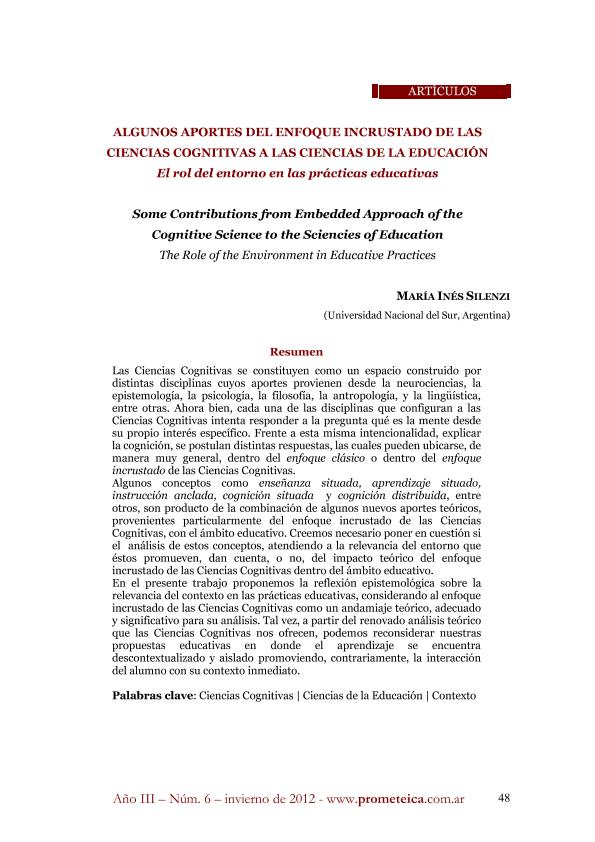Artículo
Las Ciencias Cognitivas se constituyen como un espacio construido por distintas disciplinas cuyos aportes provienen desde la neurociencias, la epistemología, la psicología, la filosofía, la antropología, y la lingüística, entre otras. Ahora bien, cada una de las disciplinas que configuran a las Ciencias Cognitivas intenta responder a la pregunta qué es la mente desde su propio interés específico. Frente a esta misma intencionalidad, explicar la cognición, se postulan distintas respuestas, las cuales pueden ubicarse, de manera muy general, dentro del enfoque clásico o dentro del enfoque incrustado de las Ciencias Cognitivas. Algunos conceptos como enseñanza situada, aprendizaje situado, instrucción anclada, cognición situada y cognición distribuida, entre otros, son producto de la combinación de algunos nuevos aportes teóricos, provenientes particularmente del enfoque incrustado de las Ciencias Cognitivas, con el ámbito educativo. Creemos necesario poner en cuestión si el análisis de estos conceptos, atendiendo a la relevancia del entorno que éstos promueven, dan cuenta, o no, del impacto teórico del enfoque incrustado de las Ciencias Cognitivas dentro del ámbito educativo. En el presente trabajo proponemos la reflexión epistemológica sobre la relevancia del contexto en las prácticas educativas, considerando al enfoque incrustado de las Ciencias Cognitivas como un andamiaje teórico, adecuado y significativo para su análisis. Tal vez, a partir del renovado análisis teórico que las Ciencias Cognitivas nos ofrecen, podemos reconsiderar nuestras propuestas educativas en donde el aprendizaje se encuentra descontextualizado y aislado promoviendo, contrariamente, la interacción del alumno con su contexto inmediato. The Cognitive Science is constituted as a space built for different disciplines whose contributions come from the neuroscience, epistemology, psychology, philosophy, anthropology, and linguistics, among others. Now, each of the disciplines that make up the Cognitive Science attempts to answer the question what is the mind from its own specific interest. Faced with this same intention, to explain cognition, are postulated different responses which may be located within the classic approach or embedded approach of Cognitive Science. Concepts such as education located, situated learning, anchored instruction, situated cognition and distributed cognition, among others, are products from the combination of few new theoretical contributions, from the embedded approach of Cognitive Science, with the educational field. We need to question whether the analyses of these concepts, based on the relevance of the environment, promote, or not, considering the theoretical impact of the embedded approach of Cognitive Science within the educational field. In this paper we propose an epistemological reflection on the relevance of context in educational practices, considering the embedded approach of Cognitive Science as a theoretical framework appropriate and meaningful for its analysis. Perhaps, from the renewed theoretical analysis gives us the Cognitive Science we reconsider our educational proposals in which learning is decontextualized and isolated promoting, contrary, student interaction with its immediate context.
Algunos aportes del enfoque incrustado de las ciencias cognitivas a las ciencias de la educación: El rol del entorno en las prácticas educativas
Título:
Some Contributions from Embedded Approach of the Cognitive Science to the Sciencies of Education: The Role of the Environment in Educative Practices
Fecha de publicación:
05/2012
Editorial:
Universidad Nacional de Mar del Plata
Revista:
Prometeica
ISSN:
1852-9488
Idioma:
Español
Tipo de recurso:
Artículo publicado
Clasificación temática:
Resumen
Palabras clave:
Ciencias Cognitivas
,
Ciencias de La Educación
,
Contexto
,
Interacción
Archivos asociados
Licencia
Identificadores
Colecciones
Articulos(CCT - BAHIA BLANCA)
Articulos de CTRO.CIENTIFICO TECNOL.CONICET - BAHIA BLANCA
Articulos de CTRO.CIENTIFICO TECNOL.CONICET - BAHIA BLANCA
Citación
Silenzi, María Inés; Algunos aportes del enfoque incrustado de las ciencias cognitivas a las ciencias de la educación: El rol del entorno en las prácticas educativas; Universidad Nacional de Mar del Plata; Prometeica; 6; 5-2012; 48-65
Compartir
Altmétricas




